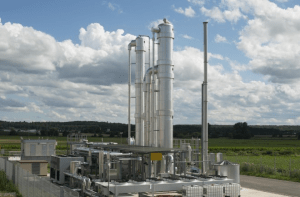Biogas Plant Specifies Bredel Hose Pumps for Abrasive Organic Waste
 Minimizing maintenance is crucial when commissioning a system to handle challenging fluids. Pressure, abrasive content, and temperature all impact reliability and process uptime. Selecting the right pump for the process is paramount.
Minimizing maintenance is crucial when commissioning a system to handle challenging fluids. Pressure, abrasive content, and temperature all impact reliability and process uptime. Selecting the right pump for the process is paramount.
For a European energy producer, specifying a Bredel hose pump in their Biogas plant to handling abrasive organic waste has delivered impressive results. Maintenance is typically lower than other pump types and, when required, can be performed quickly in-situ.
Learn how Bredel technology helps this customer to reduce their carbon emissions by over 4,000 tons per year.
One of the largest biogas plants in France has recently been commissioned, with three Bredel 65 hose pumps from Watson-Marlow Fluid Technology Group (WMFTG) at its core. The pumps are being used to transfer homogenous abrasive slurry in three process stages vital for the sustainable supply of energy in the region.
The new biogas plant, which was designed, built and commissioned in 2017, is set to produce 2.2 million m³ of biomethane per annum, feeding the GRDF grid (Gaz Réseau Distribution France) and providing energy for 10% of the local population. Almost 50% of the digested organic waste mix processed at the new plant comprises manure from cattle and poultry farming. The remainder is supplied by local fish canneries and slaughterhouses.
By 2030 the European biogas industry will produce as much “green gas” (biomethane produced by upgrading of biogas and SYNGAS) as “green electricity”.
Approximately 18-20 billion cubic meters of biomethane could be produced in Europe, this would correspond to about 3% of the natural gas consumption of the European Union. Biomethane production will achieve substantially different levels in each European country due to different local conditions.
Currently, two countries (France and United Kingdom) have introduced feed-in-tariffs for biomethane injection into the natural gas pipeline network at levels which make the production of biomethane economically comparable with the generation of “green” electricity.1
In a pre-treatment step at this plant, the different waste streams are mixed into a homogeneous organic suspension, free of inert material, prior to digestion. The specific process (mesophilic digestion) deployed at the plant means that waste has to stay in the digester for 50 days (instead of 17-21 days typically), not just because of the lower processing temperatures involved, but because vegetable matter, which takes longer to digest, accounts for 20% of the content. This vegetable matter also means that volume reduction after digestion is just 20%, rather than 50%, which is a more typical waste volume reduction in biogas plants.
Design and Planning
Bredel 65 pumps fulfill three principal process transfer applications at the French plant: from buffer input to buffer tank via heat exchangers; from the buffer, input to buffer tank through pasteurizers, and from buffer tank to digester via heat exchangers.
The pumps’ installation needed consideration for the pipework system from buffer input to the five-meter high buffer tank (via heat exchangers), through considerable discharge pipe lengths and bends. The impact on back pressure due to the long pipe runs could negatively affect many other pump types. However Bredel pumps maintain constant flow against pressure, over the whole life of the hose.
At this biomethane production site, Bredel 65 pumps run at relatively low speeds of 14 rpm to generate a flow of 4m3/h. In the first part of the process, the slurry has a temperature of around 30C and viscosity of 500 cPs, with 9-12% dry content, although potentially up to 60%, creating very high abrasion. This temperature rises to between 40-55C in the second stage of the digestion, but with a consequentially reduced viscosity. After pasteurization, the temperature increases again to 70C.
Bredel pumps transfer viscous and abrasive slurries and sludge with up to 80% solids in suspension. Pump capacity is entirely independent of suction and discharge conditions, and this application the choice of natural rubber hose means that fluids with temperatures up to 80C can be pumped, Hoses have a soft inner bore which cushions large and abrasive particles, whilst the multiple layers of reinforcing nylon and the tough outer rubber of the hose, provide excellent performance and long hose life.
Low TCO
The relatively low Bredel pump running speed of 14rpm in this application relates to uptime and TCO (total cost of ownership) requirements. Low maintenance is paramount in biogas plants, which are highly automated with few human employees. The plant only has a staff of three, for example.
The potential for repeated maintenance with PC pumps is high. For instance, the stator is destroyed within seconds if the pump accidentally runs dry. Factors such as pressure, abrasive content and temperature can all negatively affect PC pump performance.
In contrast, the Bredel pump is foolproof in that it is impossible to make mistakes such as run dry. Furthermore, there is only one wear part – the hose – which only takes around 30 minutes to replace (in-situ) and does not require the services of skilled personnel. Importantly, hose life is repeatable, ensuring that biogas plants can plan preventative maintenance accordingly.
Ultimately, digestate from the French biogas plant is reused as a natural organic fertilizer for 20,000 hectares of surrounding farmland, reducing the need to procure 60 tonnes of chemical fertilizers and representing annual cost savings up to €15,000 for each of the 17 adjacent farmers. Furthermore, the digestion process reduces carbon emissions by 4,222 tons of CO2.
European Biogas Association



